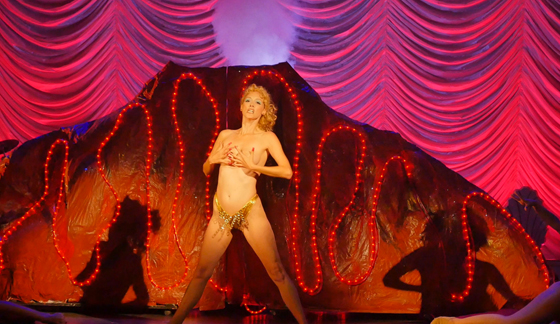YOU DON’T NOMI
Directed By: Jeffrey McHale
Starring: Elizabeth Berkley, Paul Verhoeven, Adam Nayman, April Kidwell
Runtime: 92 mins.
RLJE Films
My introduction to Paul Verhoeven’s Showgirls was definitely by accident on some random childhood afternoon on a local network because my memories are of a hazy mishmash of ‘why does Jesse-from-Saved by the Bell looked Like That?’ and laughing at the crude 90s tech that they used to ‘paint’ dodgy cgi bras over very naked chests. So in tackling McHale’s documentary You Don’t Nomi, I knew I’d have to take another look. I don’t regret it as such but I was not converted into the cult that this doc’s trailer alluded to. That doesn’t mean You Don’t Nomi isn’t worth a look for the uninitiated. On its surface, You Don’t Nomi may appear a puff piece on something so-bad-it’s-good but it puts in a surprising amount of work to show not only Showgirls’s second life as a camp crowdpleaser but also how a critically reviled film evolves over time–even in the eyes of its filmmakers.
There is no better way to describe the 1995 critical reception to Showgirls than dog pile. It was brutal in that way that it becomes a sport unto itself to find the snarkiest pull quotes. It tanked Elizabeth Berkley’s transition from sitcom actress to the big screen and took the sexual thriller momentum that Verhoeven had in the US off of 1992’s Basic Instinct and sent him back to the more marketable sci-fi with Starship Troopers (Instinct was preceded by Total Recall and Robocop). The doc delves deep into Verhoeven’s career and finds parallels and themes that connect Showgirls back into his work in Europe before he escaped to Hollywood. Unfortunately the documentary did not manage to include modern interviews with any of the creative forces on the film but again, in diving into archived footage, the documentary exposes how Verhoeven and Berkeley in particular have decided over time to try and sell that they knew all along that their film was camp. As one of the speakers in the doc says, camp is “failed seriousness,” so I don’t really buy their attempt to control that narrative but as a storyline in the documentary, it’s very amusing.
Despite the box office flopping, Showgirls found a second life in midnight screenings, drag shows and an off-broadway musical. For me, Nomi hits its stride by zeroing in on the experience that the actress who played Nomi in the musical parody had and the difference it made in her life. Watching her account, as well as those of the drag hosts of sold out midnight showings I kept thinking about that speech from Pixar’s Ratatouille where critic Anton Ego says “the average piece of junk is probably more meaningful than our criticism designating it so.” -Hey if McHale can take a campy stripper movie seriously, I can defer to the wisdom of the cartoon rat movie. Even though I couldn’t relate to their obsession, I can certainly pinpoint pop culture hills I will die on and on that level I enjoyed hearing from such a well researched niche.
You Don’t Nomi is now streaming On Demand and digital, an additional review by Mike Gencarelli was posted earlier here



